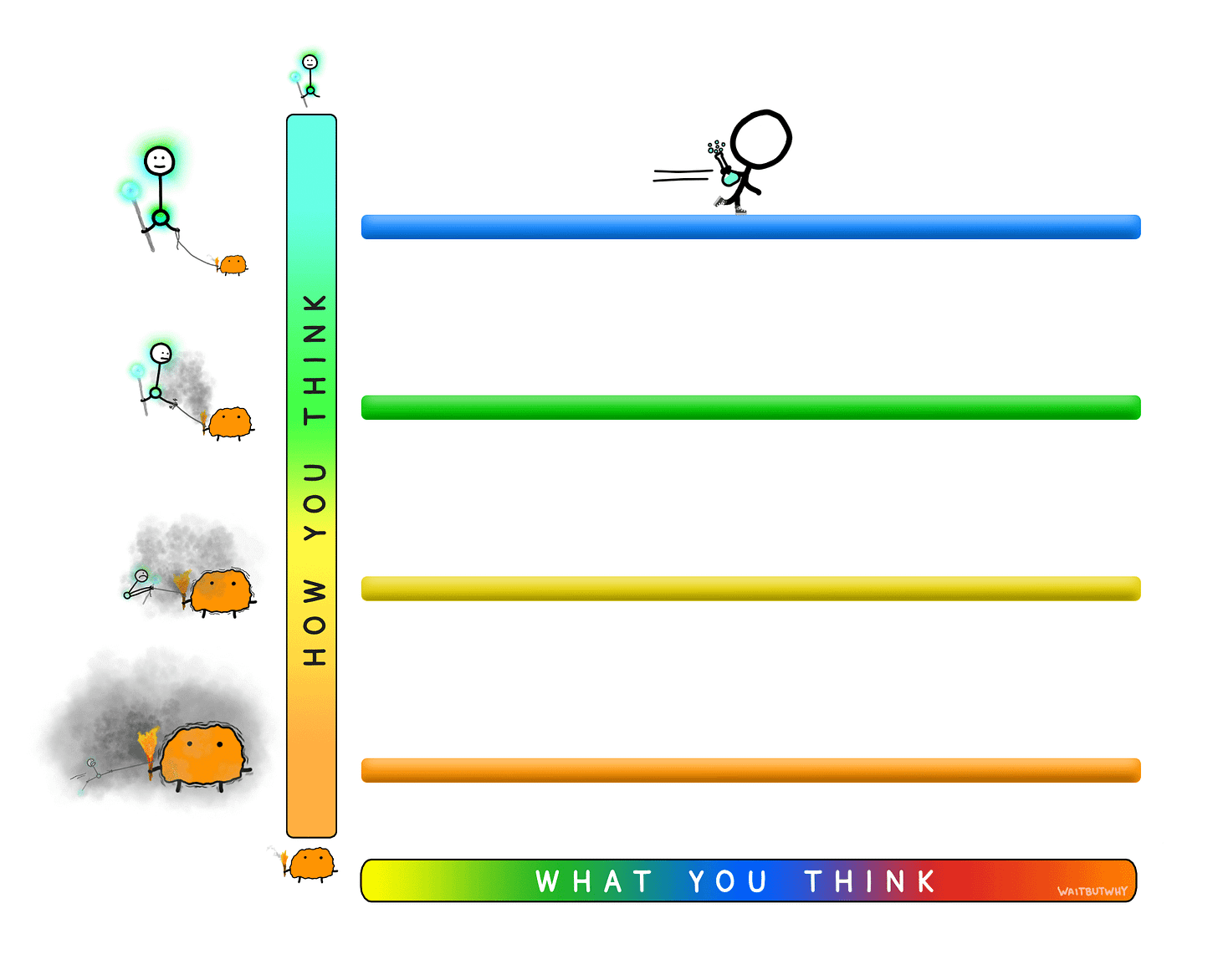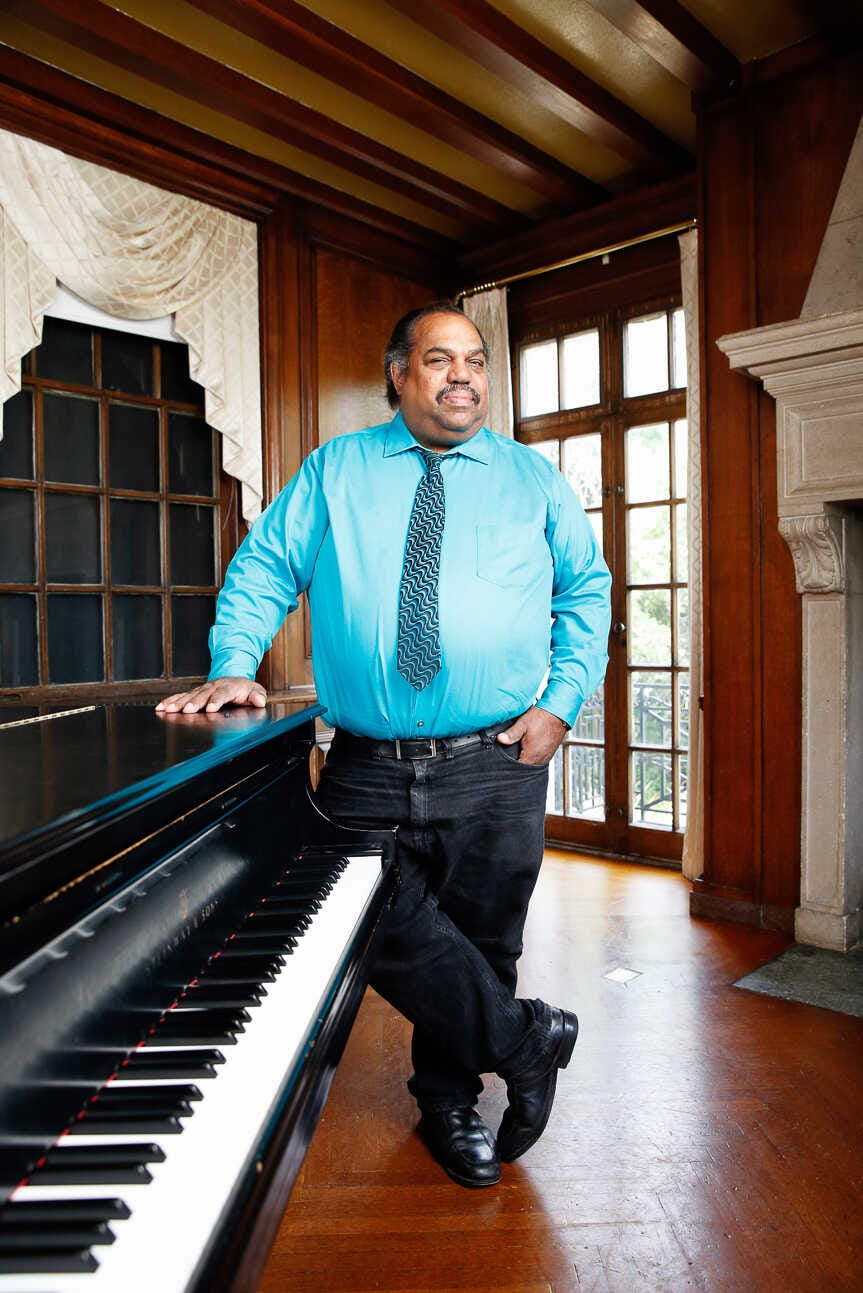Quick tip that increased my IQ *and* made me more compassionate
“Think like a ______, not like a ______, ______, or ______” (guess what)
(4 min read)
A brilliant post has been on my mind since I read it in 2019.
Why do I want to share it today?
Tensions are high in the United States.
It feels worse than March 2020 when the world was full of uncertainty from a new virus that was killing countless people.
Back then, there was a hope that this universal enemy (COVID-19) would unite the country and the world like never before.
Today, the U.S. population feels more divided than any time since the Civil War.
Progressives vs conservatives.
Some historians even predict that it will turn into a new Civil War, with bloodshed.
To avoid that disaster, we must remind ourselves:
Take deep breaths.
Find reliable, non-sensationalist sources of information.
Appreciate what you have in the present.
Be a top-rung thinker. This is what we’ll explore here.
Tim Urban of Wait But Why is my favorite writer, as I’ve written about before, including here in “Dazed but not dead”.
In 2019, he wrote a 17,000-word post called “The Thinking Ladder”, which eventually became a chapter in his 500-page book, What’s Our Problem? A self-help book for societies which is so good.
That chapter takes 61 minutes to read, which is far beyond what you’re looking to do when you open issues of my newsletter.
You’re a smart and efficient person who wants to improve themselves and the world.
So you’ll spend just a couple minutes right now reading this fun and helpful recap (featuring images from Tim).
If more people approached life this way, the world’s problems would evaporate. We need to:
Worry less about what others’ opinions are. (Diversity of viewpoints makes for an interesting, healthy world.)
Be careful about how we formulate our opinions.
Let’s plot this concept on 2 axes.
The horizontal axis represents a broad spectrum of viewpoints on any given topic.
The vertical axis is a measurement of your process for learning (which is how you assemble your beliefs).
Is your higher mind (best self) in control? Or is your primitive mind (lizard brain) dominating?
To simplify, imagine a ladder with 4 rungs.
The top rung (where your highest self is in control) we’ll label “Thinking like a SCIENTIST”.
Let’s hear Tim’s descriptions of each rung.
🧪 Thinking like a SCIENTIST
To top-rung thinkers, chasing truth is like climbing through thick fog up an infinitely high mountain.
It’s the pursuit of something that can never be fully achieved, but it can be approached—and their goal is simply to continue moving up the mountain.
They make their way up the mountain using their sacred process—the scientific method—as their compass.
They’re intellectually flexible about everything—except the process itself.
[…]
Scientists, so rigid about their high-up position on the How You Think axis, start out totally agnostic about their horizontal position on the What You Think axis.
Early on in the puzzling process, a Scientist treats their rung like a skating rink, happily gliding back and forth and flip-flopping their opinion as they explore different possible viewpoints.

🏀 Thinking like a SPORTS FAN
Most real-life sports fans want the games they watch to be played fairly.
They don’t want corrupt referees, even if it helps their team win.
They want their team to win fair and square.
They place immense value on the integrity of the process itself.
It’s just… that they really really want that process to yield a certain outcome.
They’re not just watching the game—they’re rooting.
⚖️ Thinking like an ATTORNEY
[Attorneys] decide to take on a case, or they’re assigned to one, and from the first moment they’re thinking about the case, they already know their overall stance—and this is where they’ll stay, regardless of what their reasoning or the evidence says.
The client is not guilty. Now let’s figure out why.
⛪ Thinking like a ZEALOT
When you forget that people and ideas are separate, your entire thinking process is laden with a crippling burden: to protect your beliefs like you protect your body.
You’ve traded in the Scientist’s horizontal flexibility for a total willingness to vertically compromise on your thinking process, and you’ve swapped the Scientist’s vertical rigidity that keeps their process on the top rung for a horizontal rigidity that nails your feet right into the Idea Spectrum, right at the point where your viewpoints live.
[…]
When you’re thinking like a Zealot, humility feels weak and shameful.
You’ll never say “I don’t know,” because that sounds the same to you as saying “I don’t know who I am.”
You do know.
Your beliefs are a rock-solid reflection of the objective truth, period.
Check out this helpful graphic recap of the chapter.
During the current political turmoil, what stands out to me is:
We should be evaluating thinkers based on how they think rather than what they think.
We should be second-guessing our own views continually, updating them as we encounter new insights.
We shouldn’t consider so much what others have said. Instead, prioritize objective reasoning from first principles.
We should acknowledge that the world is complex and foggy and is a puzzle that we will never “complete” but is worth making progress on.
Whenever you think you disagree with someone, get curious.
It could be a learning opportunity (for YOU).
The reason there is so much negative energy is because people on both sides are experiencing real pain.
“Hurt people hurt people.”
We all need to get curious to understand the root causes and resolve them.
Until we understand people’s pain, this tension could only get worse.
Even knowing these principles, I still catch myself:
I hear that someone likes Trump, and I vomit 🤮.
Then I feel so tempted to block them from my life.
If it’s a newsletter writer, my finger hovers over the Unsubscribe button.
But I’m doing my best to judge people not on the horizontal axis (what they believe) but instead on the vertical axis (how they think).
I want to surround myself with as many top-rung thinkers as possible.
We can go ice-skating along the top rung, changing our views freely.
I feel proud of my ability to change my mind.
Gliding along on the political spectrum is just one example.
I grew up in the south and identified as conservative.
Later, I changed, and these days my views tend to be strongly progressive.
But it’s hard.
Probably human nature + our society lead us to fall lower on the Thinking Ladder by default.
Staying near the top requires your consistent intention.
Mini-rant
The massive political tension we’re experiencing in the United States is a failure of the whole population to extract ourselves from this senseless 2-party system that is doomed to perpetuate divisiveness and drama that will only get worse as the world plunges deeper into social media and sensationalism.
If a population devolves into “us vs them”, it gets dangerous and even bloody. Civil war. We need to find a better way.
Ranked Choice Voting is a way. See:
💬 Question for you
What has your experience been of this political divisiveness (or any other conflict)?
How do you stay calm and curious (keeping your highest self in control) and have cordial, productive conversations?
How do you opt out of interactions with bottom-rung thinkers who stubbornly cling to a certain position?
👀 Caught my eye this week:
I find this approach interesting.
How One Man Convinced 200 Ku Klux Klan Members To Give Up Their Robes

🕙 What we learned in recent posts:
🟢 The 9 best diets (2 are so weird!)
🟢 What does 20 hours a week get you?
Thanks for clicking the ❤️ button on this post so more people can discover it on Substack 🙏










> How do you stay calm and curious (keeping your highest self in control) and have cordial, productive conversations?
My flavor is curiosity, as you described, and also thinking of life as a game. Also, remember nobody has it figured out so WHAT people think = a theory to explore.
That said, I also don’t engage with zealots on their area of zeal. There’s nothing to be won there and I’m not an ambassador nor proselytizer for much at all. The things I do hold opinions on are the things I will talk about only with trusted people, including critics and dissidents, but definitely not with zealots who are either for or against.